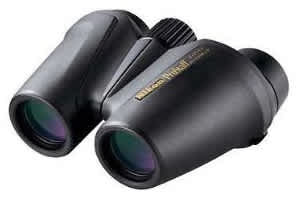Choosing a Pair of Hunting Binoculars
In Search of Whitetails 10.06.12

A pair of good hunting binoculars is indispensable for hunters in the field. This may be the most important piece of gear in your inventory, and there are a lot of choices. What magnification is right? Should you choose a porro prism or roof prism? How important is it for binoculars to be waterproof, or shockproof? In this article, we’ll explain some of the important features of binoculars for hunting, and review some of the most popular models.
Key Features of Hunting Binoculars
Binoculars come in a variety of sizes, magnifying powers, and price ranges. Here are some of the most relevant features for deer and turkey hunters.
Magnification
This is usually described as something like “8×25″. The first number is the magnification (8x), and the second number is the diameter of the objective lens (in millimeters). The larger the lens, the larger the field of view and the brighter the image.
Internal prism
All binoculars employ either a Porro prism or a roof prism. Porro prisms provide a slightly clearer, more three-dimensional image and better depth perception. They generally provide a wider field of view, which important when glassing for game in fields and open areas. You can recognize binoculars with porro prisms because the eyepiece is noticeably offset from the lens. This is because porro prisms are a bit bulky, which generally calls for a larger binocular frame.
The components of a roof prism overlap closely, allowing the objective lenses to line up directly with the eyepieces. This allows for a more streamlined, compact binocular design. You’ll often see roof prisms in compact pocket-sized binoculars.
Lens Coatings
Manufacturers apply chemical coatings to the lenses of binoculars to reduce glare while making the viewed image as bright as possible. The number, extent, and quality of these coatings directly affects how well your binoculars will work, especially in low-light conditions. Terms for lens coatings are as follows (the last one is the best):
- Coated. A single layer is applied to at least one lens surface
- Fully-coated. A single layer is applied to all air-to-glass surfaces
- Multi-coated. Multiple layers are applied to at least one lens surface
- Fully multi-coated. Multiple layers are applied to all air-to-glass surfaces
Eye Relief Cups
Eye relief cups are twist-up cups on the eyepiece of the binoculars that create a gap (empty space) between your eye and the glass. This creates a little darkness around the circle of light that you’re looking at, making it a bit easier on your eyes when looking through the binoculars (hence the term). I’ve noticed it’s really useful for if you wear glasses or shooting glasses while out in the field.
Hunting Binoculars Reviews
Let me tell you something about shopping for binoculars. It is HARD. The reason is that binoculars aren’t just for hunters – they’re for bird watchers, astronomers, sports fanatics, even opera-goers. As a result, when you start looking at the bestselling binoculars, many of them aren’t ideal for hunting. They’re too bulky or too heavy, or not rugged enough to be taken out in the field.
I’ve gone through and removed all of these, focusing only on binoculars that are good for hunting. That means lightweight, durable. Maybe waterproof, hopefully somewhat compact. Here are some of my favorites, including the pair I bought for myself.
Bushnell Powerview 8×25 Porro Binocular
|  |
Nikon ProStaff ATB 12×25 Waterproof Binocular
|  |
Bushnell Trophy XLT 10×42 Bone Collector Roof Prism Binoculars
|  |
 Bushnell H2O Waterproof/Fogproof Compact 8×26 Binocular
Bushnell H2O Waterproof/Fogproof Compact 8×26 Binocular

After much research and deliberation, these are the binoculars I bought for myself. I couldn’t be happier with them. The magnification (8x) is ideal for the dense timber where I typically hunt. Since I hunt primarily with a bow, I like that these were compact and lightweight.
Waterproofing is more important than you think. Already I’ve set these binoculars down on dew-soaked grass or had them out in the rain. I’ve never had any issues with fog or moisture.
 BaK-4 prisms and multi-coated optics for clear, bright images
BaK-4 prisms and multi-coated optics for clear, bright images- Non-slip rubber armor and Soft Texture Grip. I love the feel of the grip, and these absorb shock as well.
- 8.5-foot close focus distance; 15mm eye relief. This is a deep eye relief. Great for use with glasses.
- Large center-focus knob and single-eye adjustment.
Bushnell Deluxe Binocular Harness
Here’s a binocular harness from the maker of most of these hunting binoculars – Bushnell. Elastic straps position the harness comfortably on your chest, while the back panel distributes your binoculars’ weight evenly about your back and shoulders.
An optics rest below the chin enables quick-draw sighting if you need to look at something while afield.

Summary: Binoculars as Hunting Tools
Without a doubt, my new hunting binoculars were the most important addition to my gear inventory last year. I’ve used them for scouting, still-hunting, looking for game on my tree stand, and even to look for rubs in open woods. Last year I used them to watch a tom strutting for his flock of hens for over an hour – a truly magical experience in the woods that I wouldn’t have been able to enjoy without a good pair of binoculars. Get one today!
The post Hunting Binoculars Reviews appeared first on In Search of Whitetails and is republished with permission.








